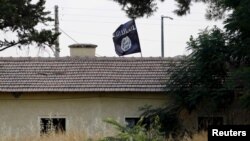Incidents of violent infighting between Islamic State (IS) extremists in Syria and Iraq are on the rise with rifts developing between elements within the terrorist group and arguments erupting over the distribution of spoils, sex slaves and cash, say local political activists opposed to the militants.
A prominent Libya-born commander of the terrorist group, Abu Huzaifa al-Libi, was shot dead last week in the Syrian town of Raqqa during a heated argument over the redeployment of some fighters to the neighboring province of Hasakah, say local activists who asked not to be identified.
The incident follows a fierce gunfight that erupted in mid-August between IS members to the west of Iraq’s Mosul in the Baaj region, in which 17 extremists died in an argument over of the division of money and power. According to Saeed Mamouzini, a spokesman for the Kurdistan Democratic Party, that fight involved fighters loyal to some of the most prominent IS commanders, including Abu Omar al-Shishani, a Chechen, and Haj Nasser al-Mawla, who oversees the group’s finances in Mosul.
Reports of infighting have noticeably increased since Kurdish-led forces ousted IS fighters in June from the logistically important Syrian border town of Tel Abyad, a crucial way station for the terrorist army’s foreign recruits and supplies entering Syria.
“The loss of the city of Tel Abyad has fueled this trend and strengthened the rift that exists between the elements of the organization, where supporters of each party blame the other party for the loss the city,” says Abu Mohammed of the anti-IS activist group “Raqqa is Being Slaughtered Silently.” Much of the infighting involves Syrian-born fighters of the terror army and foreign recruits with the locals resenting the power and rewards given to the foreigners. Foreign fighters receive higher salaries and generally get their pick of enslaved women.
Activists say tensions between the Syrians and foreigners can be seen on a daily basis, with each party blaming the other for supposed mistakes, like the fall of Tel Abyad. Activists of the group “Raqqa is Being Slaughtered Silently” have reported a series of internal fights in recent weeks, including a clash between locals and fighters from France and Uzbekistan.
Fear of airstrikes, drones
Another issue of dispute is over housing with local fighters complaining that the foreigners receive better accommodations.
“While the Syrians have been allocated houses on the outskirts of the city, the migrants are granted houses and places within the city and in residential neighborhoods,” Abu Mohammed told VOA. The inner city offers better protection against coalition aerial attacks, as U.S. commanders are cautious about striking inside the city for fear of causing high civilian casualties, which would be a propaganda boon for IS.
Even so, drone strikes have taken their toll, contributing to the tensions within the group. A British drone strike on August 21 targeting three U.K. nationals fighting alongside IS, including a prominent recruiter and propagandist of the group, Junaid Hussain, is adding to foreign fighters’ fears that they could be killed without warning at any moment.
IS leaders are responding to internal dissension and infighting with increasing harshness, say activists. On September 3, 40 fighters, Saudis among them, were executed for disobeying orders in the eastern Syrian province of Deir ez-Zor, according to media activist Mujahid al-Shami, who is based in the town of Al-Mayadeen. Their crime: refusing to be transferred west to Aleppo.
In August, VOA reported IS had been struck by a wave of desertions in Deir ez-Zor, alarming IS leaders, who dispatched three security detachments of trusted militants from Mosul to oversee executions. In email exchanges with VOA, activists from a group called Lift Siege, said a steady stream of IS members has been deserting, including four commanders. They named the commanders as Ammar Haddawi, Aamer Al-Naklawi, Mahmoud Al-Khalaf Al-Rasheideh and Abu Obaidah Al-Masri, who oversaw tax collection in Al-Mayadeen.
They said the fleeing commanders absconded with large amounts of cash.
This isn’t the first time that IS has been rocked by severe internal disputes. In February, there were reports of internal bloodletting and desertions by fighters picked to be suicide bombers. The head of the feared al-Hisba police force in Raqqa, responsible for the enforcement of Sharia law, fled. More than 60 foreign fighters who wanted to leave were reported to have been executed.
Activists also say many militants feel greater loyalty to their sub-groups within IS — whether based on nationality or ideological background. Syrian Kurdish commanders in northeast Syria trace IS’s internal problems to the group’s failure to capture the Syrian border town of Kobani, which the extremists besieged for months. They say the defeat at Kobani lowered morale, especially among foreign fighters who had never experienced a serious reversal in northern Syria before.




